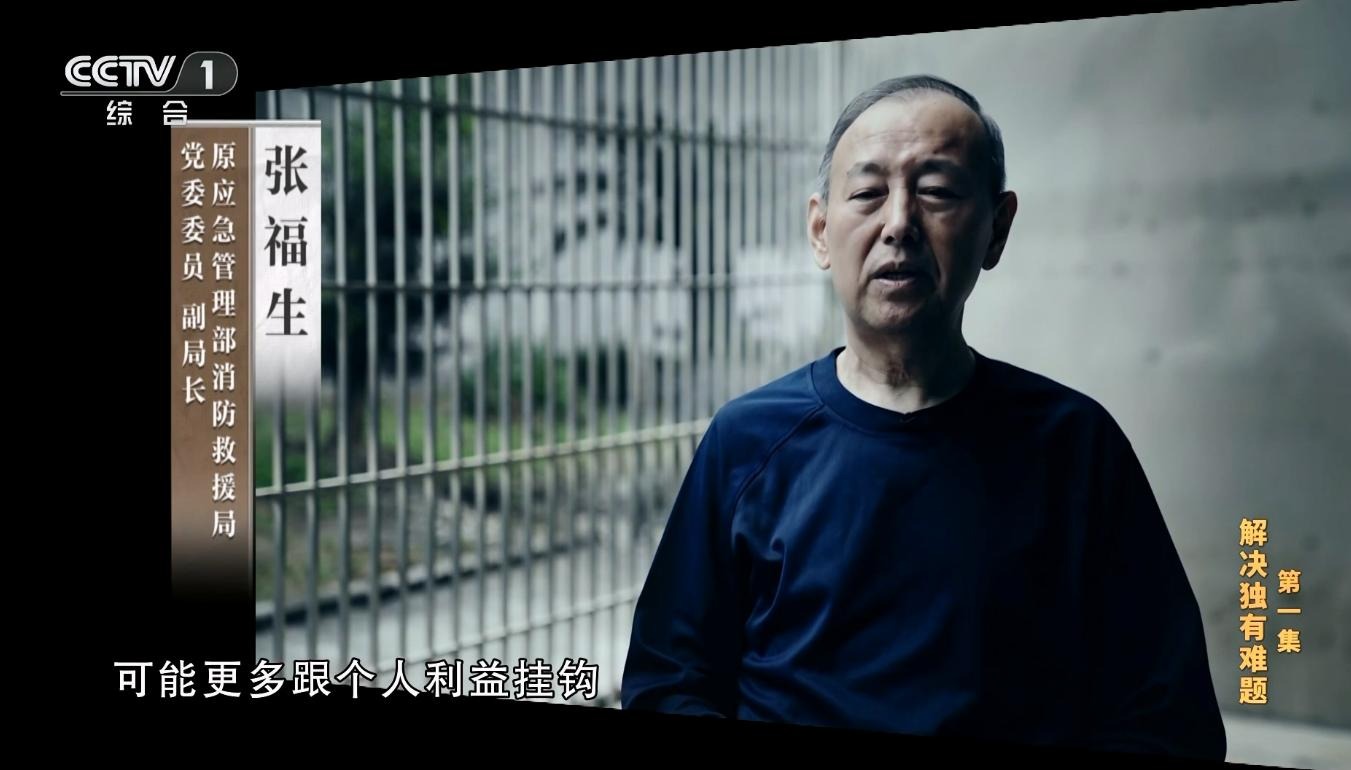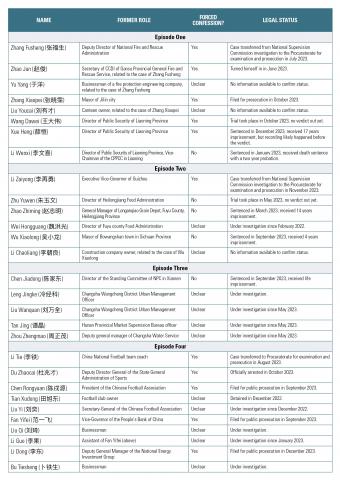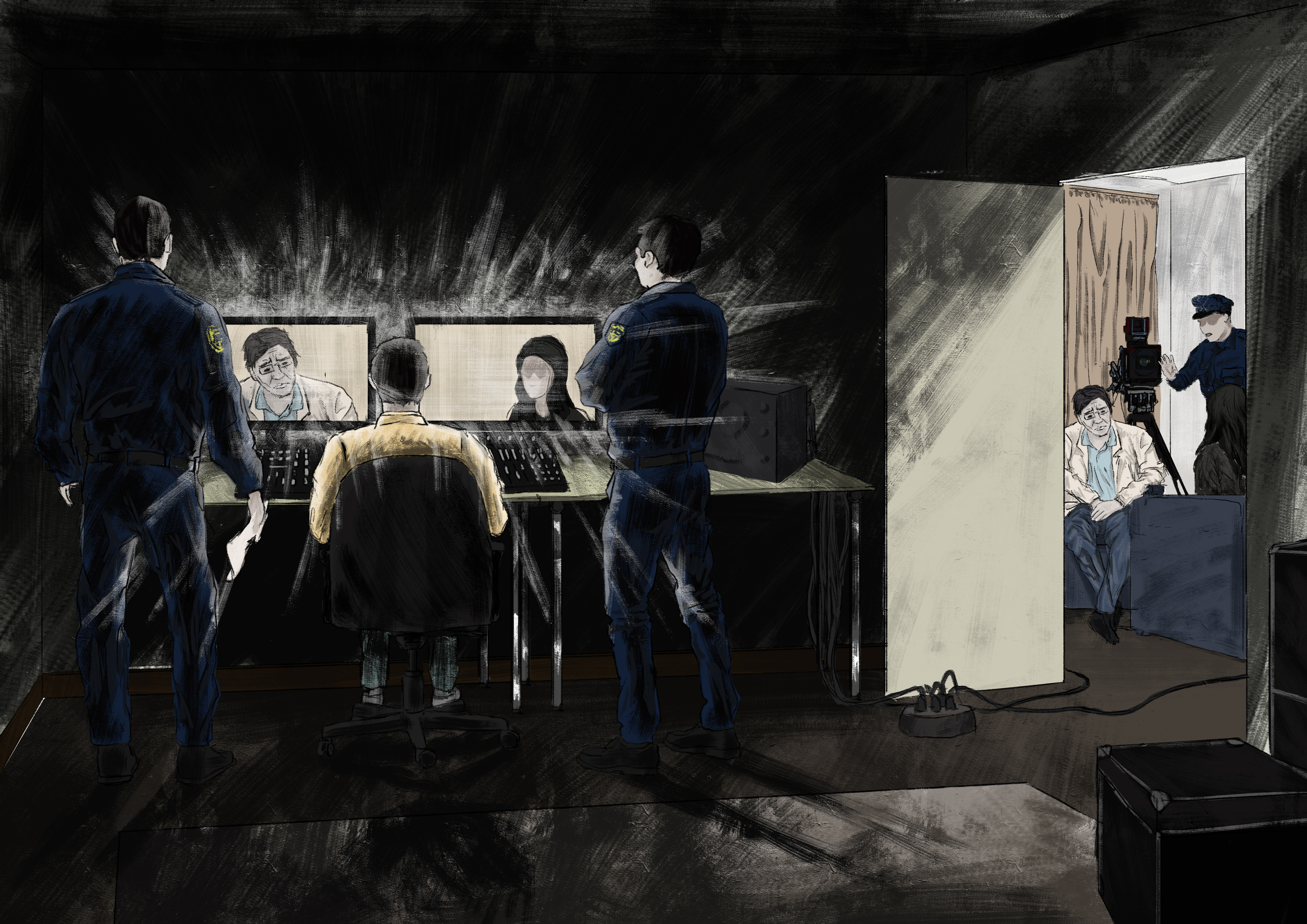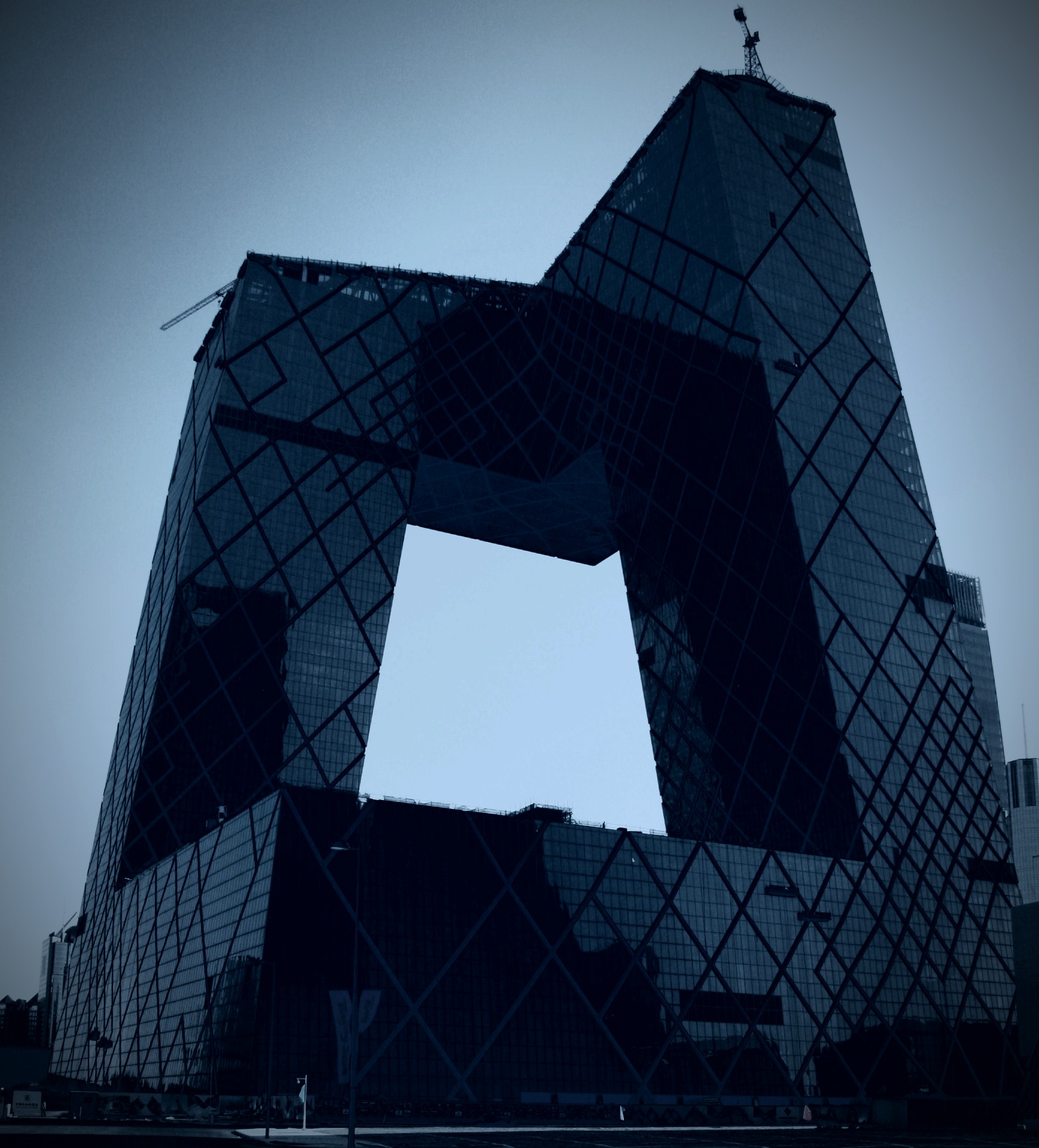Corruption "Everywhere" - Chinese TV airs Party-produced mass TV confessions
New series of forced televised confessions highlights CCP’s increased crackdown over vast swathes of society under the guise of “anti-corruption” work and its continued disrespect for international human rights standards. The successful defeat of this abhorrent practice for Chinese human rights defenders following prior action by democratic regulators in some countries must encourage other democratic authorities to hold PRC channels to account over their contributions to these ongoing human rights violations.
For China's public television CCTV, how better to start the new year than with a series of forced televised confessions? Between Saturday and Tuesday, January 6 to 9, the PRC’s main TV news channel CCTV-1 broadcast a “documentary” of four episodes co-produced by none other than the Chinese Communist Party’s internal police force, the Central Commission for Discipline Inspection (CCDI). Each episode, touted by other CCTV channels and State/Party newspapers, ran at 20.00 (8pm) at primetime to ensure a large audience.
Each one-hour episode, called Continued Efforts, Deepening Progress (持续发力 纵深推进) contained a myriad of people appearing on camera to “repent their sins”, including some 29 people who are currently in custody. Many of these individuals have yet to be tried, thus fully qualifying their appearances as “forced televised confessions” and rendering their chances of receiving a fair trial by an independent court non-existent.
The seeming purpose of the “documentary” was to broaden and ensure public support for the current “anti-corruption” campaign(s) in different fields, including finance, sports, real estate, and agriculture.
The broadcast mirrors a similar one aired almost exactly one year ago. In January 2023, CCTV-1 ran a four-part “documentary”, 永远吹冲锋号 (Always Charging Forward), in which 26 people confessed to their crimes on TV. Most of them had also not yet been brought to trial.

Screenshot: Zhang Fusheng (张福生), Deputy Director of the National Fire and Rescue Administration
A total of 29* people in, or believed to be in, custody appeared to confess in the four-part series. Confessors ranged from former senior central government officials and provincial leaders, officials from State-affiliated organs, leaders of banking institutions, to people considered responsible for the current housing market situation, and people linked to the sporting industry. In fact, it was members of China's sporting industry that received the most attention, including many senior figures within its football industry. The (former) Chinese National Football team coach, Chen Xuyuan, who is in custody and still awaiting trial, was paraded and said (translation):
“The corruption in Chinese football does not only exist in certain individual areas – it’s everywhere, in each and every aspect”.
For most of them – 21 out of 29 - no known trial has taken place nor has any sentence been issued. This makes their appearances clear-cut forced TV confessions, matching CCTV’s prior and long-standing behaviour. Five of them have already been sentenced and transferred to prison, including one person who was sentenced to death. The status of three victims remain unclear, with no public information available on the status of their trial and/or sentence.
(*Many more appeared in confession-like performances, but are not detained or under criminal investigation, and are therefore not included in our mapping of targets here.)

The broadcast of this “documentary” and the confessions coincide with a reinvigorated mass campaign in the PRC to "clean up" the targeted industry sectors. It is not unusual for the State to use TV propaganda to bolster these recurring mass campaigns, as it did in January 2023. This connection is made all the more clear by the fact that this series was a joint production between CCTV and the Communist Party’s internal anti-corruption and discipline body, the Central Commission for Discipline Inspection (CCDI).
As in more traditional forced TV confessions of lawyers, journalists, and civil society figures, each of these broadcasts has one or a few main targets (main confessors), along with a number of supporting confessors to denounce the main confessors.
This is a well-established tool of political terror. As we have learned from the forced TV confession campaigns against lawyers, journalists, and NGO workers in the past decade, the main aim of these forced TV confessions is to parade a few individuals as examples to scare the larger community into towing the party line and to instill "discipline" and political loyalty into the wider industry/field. A few victims are used as tools to silence the larger community they represent.
As many observers have noted, “anti-corruption” work has taken up notably under Xi Jinping’s chairmanship of the Chinese Communist Party. It is often used - both domestically and abroad - as a guise to purge critical voices from within the establishment or bring entire sectors into line with the central party leadership.
Find the four episodes here:
As the victims of this latest swathe of forced televised confessions obviously remain out of reach and would in any case be unable to speak freely due to the threat of extra-legal punishments inside China, we cannot know for certain how and why they recorded these confessions. However, based on numerous prior accounts of victims collected and published by Safeguard Defenders, we are all too familiar with the general “behind-the-scenes”.
In general, targets are “asked” to star in their own forced televised confession through a sticks and carrots approach. On the one hand, they may be offered a clearly described benefit, such as reduced prison time, release on bail, or improvement of treatment in detention or prison. A reduced sentence is the most common ‘carrot’. On the other hand, confession videos are almost always preceded by weeks or even months of ‘sticks’ to break the victim: torture and ill-treatment, often combined with enforced disappearances, solitary confinement, and lengthy interrogations in the CCDI’s “special investigative measure” Liuzhi or, depending on the type of victim, the Ministry of Public Security’s RSDL. In some cases, threats of collective punishment against family members and loved ones may be used. Such was the case for lawyer Wang Yu. When she refused to partake in the forced confession scam, she was shown a video of the police beating up her teenage son.
In all cases, there is never any actual choice for the targeted victims.
Safeguard Defenders’ ground-breaking 2018 report, Scripted and Staged: Behind the scenes of China’s forced TV confessions analysed the recordings of 45 confessions broadcast between 2013 and 2018, including interviews with a dozen victims or their family members. It was followed by a book, Trial By Media, as well.
This is what we found:
- Confessions are routinely made before trial, before access to a lawyer, and sometimes even before formal arrest;
- They are by no means real confessions – they are extracted through threats, torture, and fear;
- Police often write the confession script and direct the confessor’s performance;
- The confessor is dressed in costume (usually ‘tidied up’ for the camera);
- The confessor has to memorize a confession script, or a teleprompter is used;
- CCTV cooperates with the police, in some cases helping to produce the confession videos or sending their staff to work with the police to make the recordings;
- China’s televised forced confessions violate the right to a fair trial, the presumption of innocence, the right to remain silent, and the right not to self-incriminate.

Image: Artist rendition of a confession recorded and produced of a lawyer interviewed by Safeguard Defenders.
One thing does appear to set these latest documentaries apart from the “traditional” forced televised confessions of Human Rights Defenders which are usually aired as part of newscasts and often, as relayed to SD by informants within CCTV, a last-minute decision. In contrast, these “documentaries” are seemingly well planned in advanced:
After Xi Jinping came to power, CCTV and its global arm CGTN (China Global Television Network) began broadcasting the forced confessions of Human Rights Defenders and foreigners, as well as of alleged perpetrators of regular crimes, such as murder, drug crimes, corruption etc.
All of these confessions were recorded and broadcast before the confessors had gone to trial and often before they even had a chance to see a lawyer. Many were held in solitary confinement and total isolation when the recordings were made.

Image: CCTV and CGTN headquarter, Beijing, China.
While this may seem like a far-away practice for many around the world, for a long time such forced confessions of Human Rights Defenders (including foreign citizens) were broadcast internationally on CCTV’s English-language arm CGTN. Following campaigns and regulatory complaints, CGTN was found in breach of rules, fined and later taken off the air in the UK, Norway, Sweden and Australia. Similar complaints and reviews are still pending in other democratic nations, in particular in Canada.
Country by country, Safeguard Defenders worked with victims to bring their complaints before national TV regulators, asking them to review CGTN’s compliance with the relevant regulatory frameworks. It also worked with victims on public campaigns, asking broadcasters themselves carrying CGTN to take them off the air.
As a direct result, over the past years, CGTN has stopped airing forced televised confessions through their TV broadcasts, as they fear more countries may launch reviews and stop their broadcasting license in case they continue their overt complicity to these multiple human rights violations. CCTV-4, the international Chinese language channel has also followed suit.
Moreover, though less well-known, the prolonged campaigning also effectively stopped the broadcasting of forced confessions of Human Rights Defenders (HRDs) inside China, largely because they stopped being effective. The widespread attention on our Chinese language reports and regulatory actions above within Chinese HRD communities diminished the “fear and shun” effect of earlier times.
This does not mean the practice has ended altogether: focus for forced televised confessions has now primarily moved to bribery and corruption, except for a campaign to "control COVID-19 rumours" back in 2020. At the same time, the police themselves have started publishing online video recordings via their social media, and State-owned newspapers sometimes host such videos. Furthermore, the State also continues its airing of “proof of life” videos of Uyghurs, including on CGTN’s unregulated online web channels.
The impact of regulatory action where it has been taken has been swift and powerful, demonstrating there are concrete ways democratic authorities can halt these human rights violations from proliferating. This should encourage more democratic authorities to (continue to) engage on the issue and, at the very least, ensure there is no tacit complicity in the continued proliferation of this practice by PRC actors through the broadcasting of their channels on foreign soil.